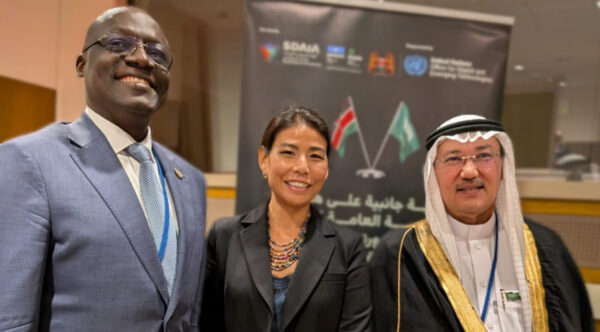By Rodrigue Fénelon Massala, special envoy to New York
On the sidelines of the 80th session of the United Nations General Assembly (UNGA), the Zindi platform, in partnership with Dalberg Data Insights, the International Center for AI Research and Ethics (ICAIRE), and the Kenyan presidency, released its 2025 report on youth employability in Kenya. The results reveal the decisive impact of data science and artificial intelligence (AI) challenges on access to employment, confirming the emergence of new professional dynamics in the digital age.
During the high-level side event titled “Empowering Nations to Ensure Inclusive Prosperity in the AI Era”, Zindi presented unprecedented data: almost one in five Kenyan users have found employment or changed careers through their participation on the platform. More than 8,000 career paths were analyzed, demonstrating a direct link between active engagement and improved employability prospects.
Compelling Results
The report highlights several trends:
- 1,500 Kenyan users (almost 20% of registrants) have changed their career trajectory since joining Zindi.
- 80% of members who completed their profile have advanced in their careers, compared to only 3% for those with incomplete profiles.
- Users who participated in at least four Zindi challenges were four times more likely to find employment.
- Team collaboration triples professional opportunities.
- Even taking just one course on the learning platform tripled employability outcomes.
These findings suggest that the future of employment in Africa is being built in communities of practice and through applied learning, rather than solely in traditional academic settings.
Africa and the Global AI Economy
According to Ambassador Phillip Thigo, Kenya’s special envoy for technology, “Africa is entering the intelligence era with a unique advantage: its people. African talents are not waiting to be integrated, they are already contributing to the global AI economy.”
This sentiment is echoed by Celina Lee, CEO and co-founder of Zindi, who emphasizes the transformation of skills into tangible jobs: “The evidence is clear: young Kenyans who engage on Zindi not only acquire skills, but also turn them into livelihoods.”
A Tool for Decision-Makers
Beyond individual paths, the report provides food for thought for governments, educators, and donors. It shows how collaborative platforms based on practice can complement educational systems and contribute to a national AI strategy.
By linking skills development to tangible employment outcomes, Zindi illustrates how emerging technologies can become catalysts for inclusive prosperity.
About Zindi and its Partners
Founded in 2018, Zindi is now the largest AI community in developing countries, bringing together over 90,000 data scientists in 185 countries. Its model, based on competitions, hackathons, and collaborative projects, has already delivered concrete solutions in sectors such as agriculture, health, climate, energy, and financial inclusion.
Its partners for this study — Dalberg Data Insights (DDI), specializing in data utilization for health, climate resilience, and education, and ICAIRE, an international center under the auspices of UNESCO based in Riyadh dedicated to AI ethics and governance — bring scientific and institutional credibility to this initiative.
Photo caption: From left to right, H.E. Ambassador Phillip Thigo, special envoy for technology, Kenya, Celina Lee, co-founder and CEO of Zindi, and the meeting’s president, H.E. Eng Sami Muqeem, Vice President of the Saudi Data & Al Authority (SDAIA), Kingdom of Saudi Arabia.


